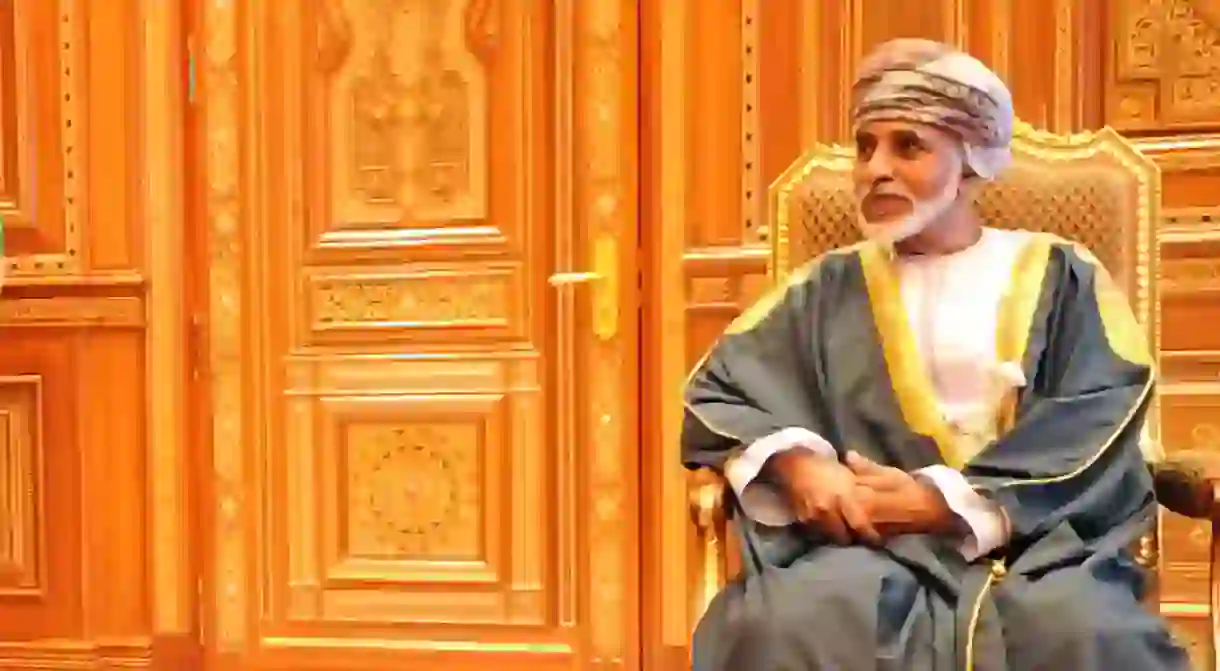Everything You Need to Know About the Sultan of Oman

As an Arab country that has developed in a short period of time, Oman has successfully maintained its identity, unique culture, traditions and heritage. This hard work and determination of the Omani people was lead by the clear vision of Qaboos Bin Said, the Sultan of Oman. Here’s everything you need to know.
Who is Sultan Qaboos Bin Said?
The Sultan Qaboos Bin Said Bin Taimur Al Said was born in Salalah in Dhofar in southern Oman in 1940. He is the 8th descendant of the Royal Al Busaidi family, which was founded by Imam Ahmed Bin Said in 1744. Sultan Qaboos is the longest serving leader in the Arab world, as he has been in the office for nearly 48 years. He attended the Royal Military Academy Sandhurst in his twenties, and then joined the British Army after graduation. He also studied in England in 1966 before returning to Oman. Unhappy with the political isolation and economic situation in his country, he removed his father from the office in 1970.
جلالة السلطان قابوس المعظم -أعزه الله- يشمل برعايتة السامية دور إنعقاد مجلس عُمان للفترة السادسة بحصن الشموخ العامر في 15 نوفمبر 2015م. #oman #muscat #qaboos #qaboosbinsaid #1970 #قابوس #عمان
A post shared by مدونة صور السلطان قابوس المعظم (@oman.1970) on Jan 23, 2018 at 10:47pm PST
The rule of Sultan Qaboos Bin Said
Before July 1970, Oman was a very underdeveloped country that lacked infrastructure, paved roads, educational institutions, healthcare and work opportunities except for farming and fishing. With the political isolation that separated it from other countries, there seemed to be no future.
Sultan Qaboos began the production of oil and used its revenues to modernize Oman. He laid a modern infrastructure, built schools, universities, hotels, hospitals, banks, ports and airports. He also established the Omani Rial as the national currency of the country, abolished slavery and changed the political system to an absolute monarchy. He united the country, naming it the ‘Sultanate of Oman’ instead of ‘Muscat and Oman’, and named Muscat as the capital city.

Omanis were also united and welcoming of a diverse society that included descendants from India, Pakistan and East Africa. These different nationalities moved to Oman during different periods of history, through which Oman had strong relations with their countries. With this in mind, Sultan Qaboos made sure to form a national identity that brought all Omanis together. He also embraced the Omani heritage, norms and traditions, and celebrated the unique culture of the country, as he urged the Omanis to hold on to their identity and to be proud of it.
Oman’s love for Sultan Qaboos Bin Said
Despite the dark times that the country has been through, the pride of Sultan Qaboos in the history and great achievements of his country has always been evident in his speeches since day one. He believed in the power and abilities of the Omani people, and encouraged them to work hard to build their country, which made him work harder to facilitate their education and provide them with work opportunities and equal rights.
For the dignity, constant developments, promising future, stability, safety and decent living they have, Omanis love and feel grateful for their great leader, leading to their reputation as one of the kindest and the friendliest people in the Middle East. It’s also why Oman is a terrorism-free country, and one of the safest places to visit and live in.
لحظات في #حب_الوطن A moment of #patriotism
A post shared by أنا عُمان Ana Oman 🇴🇲 (@abdulrahman_alhinai) on Nov 20, 2017 at 9:30am PST
Omanis celebrate November, 18 every year – the Sultan’s birthday – and consider it to be their National Day. Parades, performances, and celebrations take place, and it is usually a day off. Omanis also celebrate July, 23 every year, as it is the day His Majesty came to reign in 1970, and consider it to be their Renaissance Day. The whole country turns into a big party, filled with happiness, festivals and celebrations to show gratitude to the modern country Oman has become, and the great life Omanis are living.














